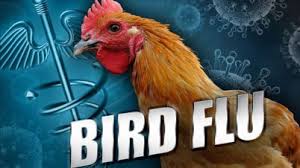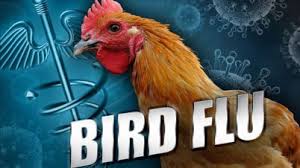
South Korea's government and a U.S. trade group said on Monday that after the United States detected its first case this year of avian flu on a commercial chicken farm, South Korea, Japan, Taiwan and Hong Kong have limited imports of U.S. poultry.
South Korea's agriculture ministry said that after a strain of H7 bird flu virus was confirmed on Sunday at a chicken farm in Tennessee, South Korea will ban imports of U.S. poultry and eggs.
James Sumner, president of the USA Poultry & Egg Export Council, a trade group said that while Hong Kong will restrict imports from the Tennessee county where the infected flock was located, Japan and Taiwan will block poultry from the state.
The potential to sell poultry overseas for major U.S. chicken companies, such as Tyson Foods Inc. will be reduced by rhis step and the confirmaiton of prsence of the bird flu virus.
The Tennessee farm infected with avian flu was contracted to sell birds to Tyson.
South Korea's the agriculture ministry said in a statement that its import ban took effect on Monday. The statement noted t
Live poultry and eggs are subject to the ban, while heat-treated chicken meat and egg products can still be imported, the statement noted.
South Korea, Asia's fourth-largest economy, has been importing eggs from the United States even as its worst-ever bird flu, or avian influenza (AI), outbreak has tightened the country's egg supplies.
According to ministry data, accounting for more than 98 percent of its total egg imports as of March 3, so far this year South Korea has shipped in nearly 1,049 tonnes of U.S. eggs.
The decision of South Korea to prohibit shipments of U.S. shell eggs was disappointing, Sumner said. He said that “because Korea's got this terrible AI problem and they were definitely in need of eggs,", its move to continue imports of certain processed egg products was “good”.
After imposing a ban in early 2016 when bird flu cases were detected in the United States, South Korea had resumed U.S. poultry imports in June last year.
South Korea can now import chicken meat from Brazil, Chile, Australia, Canada, the Philippines and Thailand due to the resumption of the U.S. import ban. Farm birds from New Zealand, Australia and Canada are trhe only places from where live poultry imports are made.
On the other hand, health officials are on the alert as the virus has surged across parts of Asia in recent months after an outbreak of avian flu in Tennessee in U.S.
After some of the animals tested positive for a strain of the highly pathogenic avian influenza (HPAI), approximately 74,000 chickens from a commercial farm in Lincoln County were culled, the Tennessee Department of Agriculture confirmed.
Tennessee government officials said that they believe that the avian influenza A(H7N9) strain in Asia that has caused serious illness in humans is not the same as the strain of the virus found in Tennessee which is a North American strain.
(Source:www.cnbc.com & www.abcnews.go.com)
South Korea's agriculture ministry said that after a strain of H7 bird flu virus was confirmed on Sunday at a chicken farm in Tennessee, South Korea will ban imports of U.S. poultry and eggs.
James Sumner, president of the USA Poultry & Egg Export Council, a trade group said that while Hong Kong will restrict imports from the Tennessee county where the infected flock was located, Japan and Taiwan will block poultry from the state.
The potential to sell poultry overseas for major U.S. chicken companies, such as Tyson Foods Inc. will be reduced by rhis step and the confirmaiton of prsence of the bird flu virus.
The Tennessee farm infected with avian flu was contracted to sell birds to Tyson.
South Korea's the agriculture ministry said in a statement that its import ban took effect on Monday. The statement noted t
Live poultry and eggs are subject to the ban, while heat-treated chicken meat and egg products can still be imported, the statement noted.
South Korea, Asia's fourth-largest economy, has been importing eggs from the United States even as its worst-ever bird flu, or avian influenza (AI), outbreak has tightened the country's egg supplies.
According to ministry data, accounting for more than 98 percent of its total egg imports as of March 3, so far this year South Korea has shipped in nearly 1,049 tonnes of U.S. eggs.
The decision of South Korea to prohibit shipments of U.S. shell eggs was disappointing, Sumner said. He said that “because Korea's got this terrible AI problem and they were definitely in need of eggs,", its move to continue imports of certain processed egg products was “good”.
After imposing a ban in early 2016 when bird flu cases were detected in the United States, South Korea had resumed U.S. poultry imports in June last year.
South Korea can now import chicken meat from Brazil, Chile, Australia, Canada, the Philippines and Thailand due to the resumption of the U.S. import ban. Farm birds from New Zealand, Australia and Canada are trhe only places from where live poultry imports are made.
On the other hand, health officials are on the alert as the virus has surged across parts of Asia in recent months after an outbreak of avian flu in Tennessee in U.S.
After some of the animals tested positive for a strain of the highly pathogenic avian influenza (HPAI), approximately 74,000 chickens from a commercial farm in Lincoln County were culled, the Tennessee Department of Agriculture confirmed.
Tennessee government officials said that they believe that the avian influenza A(H7N9) strain in Asia that has caused serious illness in humans is not the same as the strain of the virus found in Tennessee which is a North American strain.
(Source:www.cnbc.com & www.abcnews.go.com)





